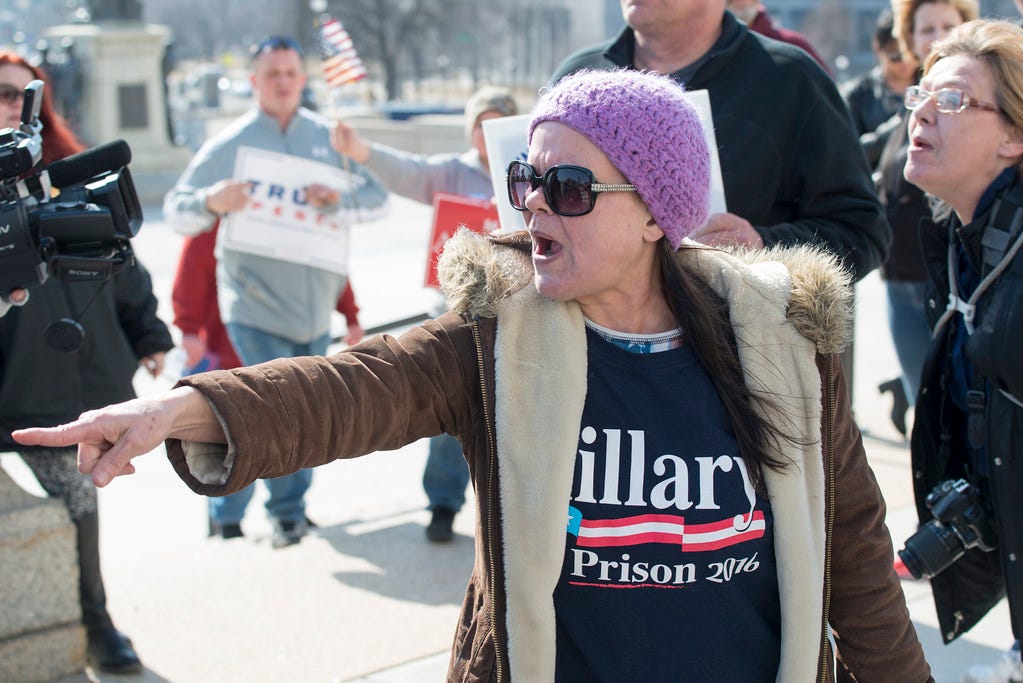In recent years, I’ve noticed a shift from calling one’s political opponents “wrong” to calling them “evil.”
It happens most often in the absence of actual relationships. For that reason, it’s unsurprising to see the language of evil directed toward national political figures and social media interlocutors. But it happens at more local levels, too. In the past year, I’ve seen local government officials, members of school boards, police officers, and protesters all characterized as evil.
In the News
In recent weeks, a Republican gubernatorial candidate in Massachusetts called Democrats “evil,” a journalist writing in Vanity Fair called Supreme Court Justice Samuel Alito “pure evil,” and a Republican candidate for Michigan secretary of state called the Democratic incumbent “a very evil, evil, evil woman.”
As Jeff Jacoby wrote earlier this month in the Boston Globe, the consequences go beyond words:
This isn’t merely abrasive politics or overheated partisanship, which are to be expected in heterogeneous democratic societies. It is toxic polarization—the populist cancer that has metastasized on both the right and the left of American culture. It turns every disagreement into a binary war of good vs. evil, right vs. wrong, enlightened vs. barbaric.
At its extremes, this dehumanization of the other side leads the most unstable among us to massacre innocents and threaten the lives of government officials.
Nor is this extreme polarization limited to a few outliers. A 2018 Axios poll found that 1 out of 5 Democrats think Republicans are evil, and slightly more Republicans think the same of Democrats. And that was before our country grappled with a pandemic, the murder of George Floyd, the 2020 election, the Capitol riots, and other highly charged national events.
In my Head
The rhetorical shift from “wrong” to “evil” is deeply worrisome, especially in a pluralistic society with deep differences over important matters. Wrong holds out the possibility of persuasion. Evil usually calls for avoidance or annihilation.
There are certainly evils in the world, and there are evil people. It’s hard to think of a word other than “evil” to describe a man who would massacre little children, whether with his own gun in Texas or through his orders in Ukraine.
But we would all do well to reserve the term for the most extreme instances. When I dip into social media, the people I most often see labeled as evil are political leaders like Donald Trump, Nancy Pelosi, Josh Hawley, Joe Biden, Ron DeSantis, and Kamala Harris.
I don’t think any of these people are evil. I don’t think many of them are very good, either. Most of them lie for political gain. Some of them are purely self-interested and deeply harmful to our society. But nobody on this list is massacring children.
Some people think abortion provides a more difficult example. Depending on your view, you might see particular Supreme Court justices or politicians as either enabling abortion or curtailing women’s rights. And your politics and reasoning might lead you to conclude that these people are themselves complicit in actively harming other human beings. Even here, though, it is a leap to move from calling someone misguided and harmful to calling them evil.
One way to guard against this tendency is to force ourselves to look for something good in our political adversaries. Earlier this year, I offered a suggestion along these lines as part of a New York Times column by Tish Harrison Warren on New Year’s resolutions:
Think about our political leaders and pray for the ones you don’t like. But make them prayers of gratitude: for the things they do well, for the people whose lives they help improve, for the ways they contract to human flourishing. And if you can’t come up with anything, ask yourself if it’s because they need to change or because you need to change.
Some readers did not welcome my advice, but I still think it’s a good resolution, with year-round applicability. And if you’re not the praying type, come up with one or two things that a political leader you really don’t like has gotten right.
In the World
The best antidote to the rhetoric of evil is to get to know actual human beings who hold views that you think are harmful and destructive. Most of us are not going to get to know national political leaders or Supreme Court justices. And most of us will not get to know the people behind social media accounts either. Rather than give up, start with someone local and face-to-face.
One way to do this is with an organization called Braver Angels, whose mission is to “bring Americans together to bridge the partisan divide and strengthen our democratic republic.”
Braver Angels brings together political partisans at the grassroots level through workshops, debates, and campus engagement, “not to find centrist compromise, but to find one another as citizens.”
And, I might add, to find one another as human beings.
One more thing
Today (Friday) is another day of Supreme Court opinion releases. It’s possible that by the time you read my newsletter, the news cycle (or your personal news feed) will be engulfed with commentary about one of those opinions. If you find that to be the case, consider whether any of the ideas I’ve covered here apply to your experience today.







John, I agree entirely with your thesis. I also like the shout out to Braver Angels. I've found their national debates to be enlightening, particularly with regard to understanding where real people come up with such divergent views on topics that matter to them.
Much needed observation, followed by helpful recommendations. It IS essential that we recognize the deeply profound (and unsettling) truth voiced by Solzhenitsyn years ago, when he pulled back from wanting to call his Gulag captors “evil” with the realization that “the line between good and evil passes through every human heart.”